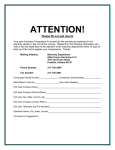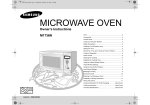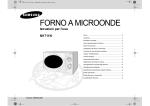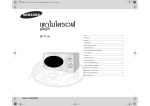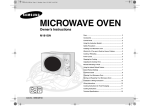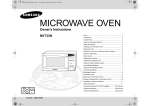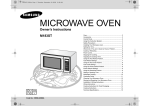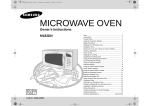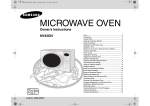Download Samsung M1711N User Manual
Transcript
M1711N_GB.fm Page 1 Friday, May 10, 2002 1:25 PM MICROWAVE OVEN Owner’s Instructions M1711N Oven..........................................................................................2 Accessories ...............................................................................2 Control Panel ............................................................................2 Using this Instruction Booklet....................................................3 Safety Precautions ....................................................................3 Installing Your Microwave oven ................................................4 What to Do if You are in Doubt or Have a Problem ..................5 Cooking / Reheating..................................................................5 Power Levels.............................................................................6 Stopping the Cooking................................................................6 Adjusting the Cooking Time ......................................................6 Using the Instant Reheat Feature .............................................7 Instant Reheat Settings.............................................................7 Manual Defrosting Food............................................................7 Cookware Guide .......................................................................8 Cleaning Your Microwave Oven ...............................................9 Installation & Wiring Instructions ...............................................9 Wiring Instructions...................................................................10 Cooking Instructions On Food Packaging...............................10 Cooking Instructions................................................................11 Technical Specifications..........................................................11 Code No.: DE68-02124N M1711N_GB.fm Page 2 Friday, May 10, 2002 1:25 PM Oven Control Panel VENTILATION HOLES GB LIGHT DOOR TIMER KNOB VARIABLE COOKING POWER CONTROL KNOB 1 2 OPEN DOOR PUSH BUTTON ROLLER RING TURNTABLE SAFETY INTERLOCK DOOR LATCHES COUPLER HOLES 4 Accessories 3 Depending on the model that you have purchased, you are supplied with several accessories that can be used in a variety of ways. 1. Coupler, already placed over the motor shaft in the base of the oven. Purpose: The coupler rotates the turntable. 5 2. Roller ring, to be placed in the centre of the oven. Purpose: The roller ring supports the turntable. 3. Turntable, to be placed on the roller ring with the centre fitting to the coupler. Purpose: The turntable serves as the main cooking surface; it can be easily removed for cleaning. ☛ 1. DEFROST 2. VARIABLE COOKING POWER CONTROL KNOB 3. TIMER KNOB 4. INSTANT REHEAT 5. OPEN DOOR PUSH BUTTON DO NOT operate the microwave oven without the roller ring and turntable. 2 M1711N_GB.fm Page 3 Friday, May 10, 2002 1:25 PM Using this Instruction Booklet Safety Precautions You have just purchased a SAMSUNG microwave oven. Your Owner’s Instructions contain much valuable information on cooking with your microwave oven: • Safety precautions • Suitable accessories and cookware • Useful cooking tips At the front of the booklet you will find illustrations of the oven, and more importantly the control panel, so that you can find the buttons more easily. The step-by-step procedures use two different symbols. Important Safety Instructions. Read Carefully and keep for future reference. Before cooking food or liquids in your microwave oven, please check that the following safety precautions are taken. ☛ ✉ Important Note 1. DO NOT use any metallic cookware in the microwave oven: • Metallic containers • Dinnerware with gold or silver trimmings • Skewers, forks, etc. Reason: Electric arcing or sparking may occur and may damage the oven. 2. DO NOT heat: • Airtight or vacuum-sealed bottles, jars, containers Ex) Baby food jars • Airtight food. Ex) Eggs, nuts in shells, tomatoes Reason: The increase in pressure may cause them to explode. Tip: Remove lids and pierce skins, bags, etc. 3. DO NOT operate the microwave oven when it is empty. Reason: The oven walls may be damaged. Tip: Leave a glass of water inside the oven at all times. The water will absorb the microwaves if you accidentally set the oven going when it is empty. 4. DO NOT cover the rear ventilation slots with cloths or paper. Reason: The cloths or paper may catch fire as hot air is evacuated from the oven. 5. ALWAYS use oven gloves when removing a dish from the oven. Reason: Some dishes absorb microwaves and heat is always transferred from the food to the dish. The dishes are therefore hot. 6. DO NOT touch heating elements or interior oven walls. Reason: These walls may be hot enough to burn even after cooking has finished, even though they do not appear to be so. Do not allow inflammable materials to come into contact with any interior area of the oven. Let the oven cool down first. 7. To reduce the risk of fire in the oven cavity: • Do not store flammable materials in the oven • Remove wire twist ties from paper or plastic bags • Do not use your microwave oven to dry newspapers • If smoke is observed, keep the oven door closed and switch off or disconnect the oven from the power supply 8. Take particular care when heating liquids and baby foods. • ALWAYS allow a standing time of at least 20 seconds after the oven has been switched off so that the temperature can equalize. • Stir during heating, if necessary, and ALWAYS stir after heating. • Take care when handling the container after heating. You may burn yourself if the container is too hot. • A risk of delayed eruptive boiling exists. PRECAUTIONS TO AVOID POSSIBLE EXPOSURE TO EXCESSIVE MICROWAVE ENERGY Failure to observe the following safety precautions may result in harmful exposure to microwave energy. (a) Under no circumstances should any attempt be made to operate the oven with the door open or to tamper with the safety interlocks (door latches) or to insert anything into the safety interlock holes. (b) Do not place any object between the oven door and front face or allow food or cleaner residues to accumulate on sealing surfaces. Ensure that the door and door sealing surfaces are kept clean by wiping after use first with a damp cloth and then with a soft dry cloth. (c) Do not operate the oven if it is damaged until it has been repaired by a qualified microwave service technician trained by the manufacturer. It is particularly important that the oven door closes properly and that there is no damage to the: (1) Door, door seals and sealing surfaces (2) Door hinges (broken or loose) (3) Power cable (d) The oven should not be adjusted or repaired by anyone other than a properly qualified microwave service technician trained by the manufacturer. 3 GB M1711N_GB.fm Page 4 Friday, May 10, 2002 1:25 PM Safety Precautions (continued) Installing Your Microwave oven • GB 9. 10. 11. 12. 13. To prevent delayed boiling and possible scalding, you should put a plastic spoon or glass stick into the beverages and stir before, during and after heating. Reason: During the heating of liquids the boiling point can be delayed; this means that eruptive boiling can start after the container is removed from the oven. You may scald yourself. • In the event of scalding, follow these FIRST AID instructions: * Immerse the scalded area in cold water for at least 10 minutes. * Cover with a clean, dry dressing. * Do not apply any creams, oils or lotions. • NEVER fill the container to the top and choose a container that is wider at the top than at the bottom to prevent the liquid from boiling over. Bottles with narrow necks may also explode if overheated. • ALWAYS check the temperature of baby food or milk before giving it to the baby. • NEVER heat a baby’s bottle with the teat on, as the bottle may explode if overheated. Be careful not to damage the power cable. • Do not immerse the power cable or plug in water and keep the power cable away from heated surfaces. • Do not operate this appliance if it has a damaged power cable or plug. Stand at arm’s length from the oven when opening the door. Reason: The hot air or steam released may cause scalding. Keep the inside of the oven clean. Reason: Food particles or spattered oils stuck to oven walls or floor can cause paint damage and reduce the efficiency of the oven. You may notice a “Clicking” sound during operation(especially when the oven is in defrosting). Reason: This sound is normal when the electrical power output is changing. When the microwave oven is operating without any load, the power will be cut off automatically for safety. You can operate normally after letting it stand for over 30 minutes. Place the oven on a flat, level surface that strong enough to safely bear the weight of the oven. 20 cm above 10 cm behind 10 cm of the side 1. When you install your oven, Make sure there is adequate ventilation for your oven by leaving at least 10 cm (4 inches) of space behind, on the sides of the oven and 20 cm (8 inches) of above. 2. Remove all packing materials inside the oven. Install the roller ring and turntable. Check that the turntable rotates freely. 3. This microwave oven has to be positioned so that plug is accessible. IMPORTANT SAFETY INSTRUCTIONS During cooking, you should look into the oven from time to time when food is being heated or cooked in disposable containers of plastic, paper or other combustible materials. IMPORTANT Young children should NEVER be allowed to use or play with the microwave oven. Nor should they be left unattended near the microwave oven when it is in use. Items of interest to children should not be stored or hidden just above the oven. 4 ☛ Never block the air vents as the oven may overheat and automatically switch itself off. It will remain inoperable until it has cooled sufficiently. ☛ For your personal safety, plug the cable into a 3-pin, 230 Volt, 50Hz, AC earthed socket. If the power cable of this appliance is damaged, it must be replaced by a special cable supplied by PENCON(UD13A1). ☛ Do not install the microwave oven in hot or damp surroundings like next to a traditional oven or radiator. The power supply specifications of the oven must be respected and any extension cable used must be of the same standard as the power cable supplied with the oven. Wipe the interior and the door seal with a damp cloth before using your microwave oven for the first time. M1711N_GB.fm Page 5 Friday, May 10, 2002 1:25 PM What to Do if You are in Doubt or Have a Problem Cooking / Reheating The following procedure explains how to cook or reheat food. ALWAYS check your cooking settings before leaving the oven unattended. First, place the food in the centre of the turntable and close the door. If you have any of the problems listed below try the solutions given. ◆ This is normal. • Condensation inside the oven • Air flow around the door and outer casing • Light reflection around the door and outer casing • Steam escaping from around the door or vents 1. Set the power level to maximum by turning COOKING POWER CONTROL knob. (MAXIMUM POWER: 800 W) ◆ The oven does not start when you turn the TIMER knob. • Is the door completely closed? 2. Set the time by turning TIMER knob. Result : The oven light comes on and the turntable starts rotating. ◆ The food is not cooked at all • Have you set the timer correctly? • Is the door closed? • Have you overloaded the electric circuit and caused a fuse to blow or a breaker to be triggered? ☛ ✉ ◆ The food is either overcooked or undercooked • Was the appropriate cooking length set for the type of food? • Was an appropriate power level chosen? ◆ Sparking and cracking occur inside the oven (arcing) • Have you used a dish with metal trimmings? • Have you left a fork or other metal utensil inside the oven? • Is aluminium foil too close to the inside walls? ◆ The oven causes interference with radios or televisions • Slight interference may be observed on televisions or radios when the oven is operating. This is normal.To solve this problem, install the oven away from televisions, radios and aerials. ✉ If the above guidelines do not enable you to solve the problem, contact your local dealer or SAMSUNG after-sales service. 5 Never switch the microwave oven on when it is empty. You can change the power level during cooking by turning the COOKING POWER CONTROL knob. GB M1711N_GB.fm Page 6 Friday, May 10, 2002 1:25 PM GB Power Levels Stopping the Cooking You can choose among the power levels below. You can stop cooking at any time to check the food. Power Level Output HIGH REHEAT MEDIUM HIGH MEDIUM MEDIUM LOW DEFROST( ) LOW 800 W 700 W 600 W 450 W 300 W 180 W 100 W ✉ If you select higher power level, the cooking time must be decreased. ✉ If you select lower power level, the cooking time must be increased. 1. To stop temporarily; Open the door. Result : Cooking stops. To resume cooking, close the door. 2. To stop Completely; Turn the TIMER knob to “0”. Adjusting the Cooking Time Adjust the remaining cooking time by rotating the TIMER knob. 6 M1711N_GB.fm Page 7 Friday, May 10, 2002 1:25 PM Using the Instant Reheat Feature Manual Defrosting Food First, place the food in the center of the turntable and close the door. The Defrost feature enables you to defrost meat, poultry, fish. GB First, place the frozen food in the centre of the turntable and close the door. 1. Turn the COOKING POWER CONTROL knob to Max Power. 1. Turn the COOKING POWER CONTROL knob to (180W). 2. Turn the TIMER knob to select Instant Reheat. (drinks or soup/sauce, fresh vegetables). 2. Turn the TIMER knob to select the appropriate time. Result : Defrosting begins. ✉ Use only recipients that are microwave-safe. ✉ Instant Reheat Settings Here are a few tips and recommendations to be followed when cooking or reheating food with whe Instant Reheat and Cooking Feature. Symbols Food Serving Size Cooking Time Standing Time Drinks 150 ml 1 min 10 sec 1 - 2 min. Soup/Sauce (chilled) 200-250 ml 3 min 2 - 3 min. Fresh vegetables 300-350 g 6 min 40 sec 3 min. 7 Use only recipients that are microwave-safe. M1711N_GB.fm Page 8 Friday, May 10, 2002 1:25 PM Cookware Guide GB To cook food in the microwave oven, the microwaves must be able to penetrate the food, without being reflected or absorbed by the dish used. Care must therefore be taken when choosing the cookware. If the cookware is marked microwave-safe, you do not need to worry. The following table lists various types of cookware and indicates whether and how they should be used in a microwave oven. Cookware MicrowaveSafe Comments Aluminium foil ✓✗ Can be used in small quantities to protect areas against overcooking. Arcing can occur if the foil is too close to the oven wall or if too much foil is used. Browning plate ✓ Do not preheat for more than eight minutes. China and earthenware ✓ Porcelain, pottery, glazed earthenware and bone china are usually suitable, unless decorated with a metal trim. Disposable polyester cardboard dishes ✓ Some frozen foods are packaged in these dishes. ✓ ✗ Can be used to warm food. Overheating may cause the polystyrene to melt. May catch fire. ✗ May cause arcing. ✓ Can be used, unless decorated with a metal trim. Can be used to warm foods or liquids. Delicate glass may break or crack if heated suddenly. Must remove the lid. Suitable for warming only. Fast-food packaging • Polystyrene cups containers • • Paper bags or newspaper Recycled paper or metal trims Glassware Glassware • Oven-to-table ware • Fine glassware • Metal • • ✓ Glass jars ✓ Dishes Freezer bag twist ties ✗ ✗ Paper • • Plates, cups, napkins and Kitchen paper Recycled paper Plastic • Containers ✗ May cause arcing. ✓ Particularly if heat-resistant thermoplastic. Some other plastics may warp or discolour at high temperatures. Do not use Melamine plastic. Can be used to retain moisture. Should not touch the food. Take care when removing the film as hot steam will escape. Only if boilable or oven-proof. Should not be airtight. Prick with a fork, if necessary. Cling film ✓ • Freezer bags ✓✗ ✓ :Recommended ✓✗ :Use Caution ✗ :Unsafe 8 For short cooking times and warming. Also to absorb excess moisture. • Wax or grease-proof paper May cause arcing or fire. ✓ ✓ Can be used to retain moisture and prevent spattering. M1711N_GB.fm Page 9 Friday, May 10, 2002 1:25 PM Cleaning Your Microwave Oven Installation & Wiring Instructions IMPORTANT NOTE : The mains lead on this equipment is supplied with a mouldedplug incorporating a fuse. The value of the fuse is indicated on the pin face of the plug and, if it requires replacing, a fuse approved to BS1363 of the same rating must be used. Never use the plug with the fuse cover omitted if the cover is detachable. If a replacement fuse cover is required, it must be of the same colour as the pin face of the plug. Replacement covers are available from your Dealer. If the fitted plug is not suitable for the power points in your house or the cable is not long enough to reach a power point, you should obtain a suitable safety approved extension lead or consult your Dealer for assistance. However, if there is no alternative to cutting off the plug, remove the fuse and then safely dispose of the plug. Do not connect the plug to a mains socket, as there is a risk of shock hazard from the bared flexible cord. The following parts of your microwave oven should be cleaned regularly to prevent grease and food particles from building up: • • • ☛ Inside and outside surfaces Door and door seals Turntable and Roller rings ALWAYS ensure that the door seals are clean and the door closes properly. 1. Clean the outside surfaces with a soft cloth and warm, soapy water. Rinse and dry. 2. Remove any splashes or stains on the inside surfaces or on the roller ring with a soapy cloth. Rinse and dry. 3. To loosen hardened food particles and remove smells, place a cup of diluted lemon juice on the turntable and heat for ten minutes at maximum power. 4. Wash the dishwasher-safe plate whenever necessary. ✉ DO NOT spill water in the vents. NEVER use any abrasive products or chemical solvents. Take particular care when cleaning the door seals to ensure that no particles: • • Accumulate Prevent the door from closing correctly 9 GB M1711N_GB.fm Page 10 Friday, May 10, 2002 1:25 PM Wiring Instructions GB Cooking Instructions On Food Packaging Microwave Symbols On the front of your oven there is a microwave oven symbol, as shown below. This symbol has been introduced for your benefit when cooking or reheating packaged food. WARNING THIS APPLIANCE MUST BE EARTHED. This appliance must be earthed. In the event of an electrical short circuit, earthing reduces the risk of electric shock providing an escape wire for the electric current. The appliance is equipped with a mains lead which includes an earth wire for connecting to the earth terminal of your mains plug. The plug must be plugged into a socket that is properly installed and earthed. ☛ The wires in this mains lead are coloured in accordance with the following code: • Green-and yellow : Earth • Blue : Neutral • Brown : Live Packaged food is also, increasingly, using a microwave symbol similar to the one below. ◆ As the colours of the wires in the mains lead of this appliance may not correspond with the coloured markings indentifying the terminals in your plug, proceed as follows. ◆ Connect the green-and yellow wire to the terminal in the plug marked with the letter E or the earth symbol ( ) or coloured green or green-and-yellow. ◆ Connect the blue wire to the terminal marked with the letter N or coloured black. ☛ When you see this Consult a qualified electrician or service technician if in doubt about any of these instructions. The manufacturer of this oven will not accept any liability for damage to persons or material for non observance of these requirements. There are no user+serviceable parts inside the oven and if the mains lead of this appliance is damaged, it must only be replaced by qualified service personnel approved by the manufacturer because special tools are required. Symbol on food packaging, the cooking instructions are based on either the IEC Power Output Rating, or the Reheating Categories A, B, C, D or E. WARNING Ensure that the plug and power cord are not damaged before use. If you have any reason to remove the moulded plug from this appliance, immediately remove the fuse and dispose of the plug. Do not connect the plug to a mains socket under any circumstances as there is a danger of electric shock. CIRCUITS Your microwave oven should be operated on a separate circuit from other appliances. Failure to do this may cause the circuit breaker to trip, the fuse to blow, or the food to cook more slowly. 10 M1711N_GB.fm Page 11 Friday, May 10, 2002 1:25 PM Cooking Instructions Technical Specifications The IEC Power Output rating is an internationally standardised rating, so all microwave manufacturers now use the same method of measuring power output. If food packaging gives cooking instructions based on IEC Power ratings, set cooking times according to the IEC Power of your oven. SAMSUNG strives to improve its products at all times. Both the design GB specifications and these user instructions are thus subject to change without notice. For example : If the cooking instructions are based on a 650W oven, then you will need to reduce some cooking time for the M1711N (800W) Ready meals are now very convenient and popular. These are meals which are already prepared and cooked by the food manufacturer, and then frozen, chilled or vacuum sealed for long life. Increasingly, heating times for such ready meals are being based on the Heating Categories A, B, C, D and E. On this instance, simply match the heating category of your oven to the instructions on the food package, and set your timer accordingly. Model M1711N Power source 230V ~ 50 Hz Power consumption Microwave 1150 W For example : If the heating instructions are 3 minutes on HIGH for a D category oven, then you will need to set your timer for less than 3 minutes on HIGH for the M1711N (E category). ☛ Always remember that cooking instructions are intended only as a guide. If you have followed the instructions and the food is still not piping hot throughout, simply return it to the oven and cook it until it is. 11 Output power 100 W / 800 W (IEC-705) • 240 V : 800 W • 230 V : 750W Operating frequency 2450 MHz Magnetron OM75S(31) Cooling method Cooling fan motor Dimensions (W x H x D) Outside Oven cavity 489 x 275 x 374 mm 306 x 211 x 320 mm Volume 20 liter Weight Net 13.5 kg approx M1711N_GB.fm Page 12 Friday, May 10, 2002 1:25 PM ELECTRONICS












